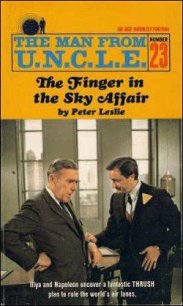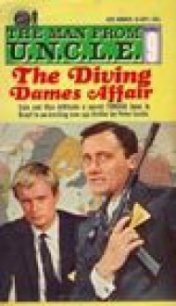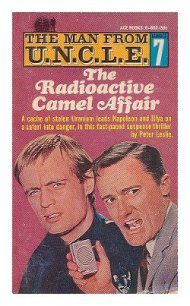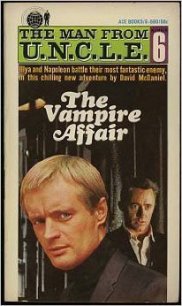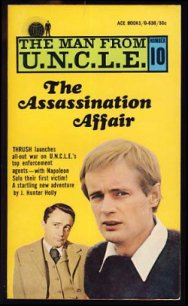The Splintered Sunglasses Affair - Leslie Peter (электронные книги без регистрации txt) 📗
Swiftly he clambered over the gate and hurried along the boundary of the field in the shelter of a tall hedge.
A half mile further on, he reached a line of trees stretching away diagonally towards the east, where a faint lightening of the sky confirmed the crowing of a nearby cock. Ten minutes later, he was standing on top of a bank bordering a narrow country lane.
Solo glanced up and down the ghostly white ribbon of the road. There was nothing to be seen—no light, no headlamp, no guards.
He plunged down the bank and set off at a jogtrot in the direction which seemed to lie farthest from Carlsen's house. Judging from the sky, it would be roughly south.
Presently he saw lights come on in a cottage on the far side of a field. The cock crowed again and a distant dog barked. Far away across the dark countryside a long, low structure was silhouetted against the sky. It looked like a flyover carrying a State Highway above the flat land; and indeed when he stopped he could hear the hum of traffic and make out the moving blurs of far-off trucks and cars above the concrete balustrade.
A little later, the road curved around a small wood and he came to a T-junction. It was quite light now. And against the far hedgerow—at last—there was a signpost.
Solo stopped. He was panting a little and he was very thirsty. For a moment he stared at the two fingerboards of the sign.
The directions were in an unfamiliar white lettering on an enamelled blue ground. And then he fell back a pace and his mouth dropped open in total astonishment....
The right-hand board said Buronzo 6. That on the left announced Novara 27. And below it was a separate sign, a green one, on which white characters spelled out the legend Autostrada Milano-Torino 3.
No wonder there had been "foreign" cars in the garage!
No wonder the license plates had been unfamiliar! No wonder he couldn't place the landscape!
His kidnappers, far from spiriting him to an adjoining State, had flown him clean across the Atlantic and he was now in Italy.
CHAPTER SIX
Solo Steals A Ride
It was two minutes short of ten o'clock, and the sun was high in the cloudless sky, before conditions in the layby were right for Napoleon Solo to act.
He had walked for several kilometers along the foot of the embankment which carried the motor road before he caught sight of the white "P" on a blue square which denoted a parking area above him. Then, after he had scrambled up and concealed himself in a clump of bushes to one side of the neat macadam lot, events had seemed to conspire to thwart his intentions.
For more than two hours, nobody pulled into the layby at all. The early drivers were all long-distance commuters with no time to spare, while the truck-drivers had too recently stopped for coffee, or were too eager to reach the city before the morning rush-hour fouled up the streets, to need a rest just here. After that, a steady procession of cars, long-distance lorries and trailers drew up, waited, and pulled away again. But either more than one stopped at a time, or the cars carried several people, or they were not powerful enough, or the driver didn't get out. There was always something wrong!
Solo lay sweating in the long grass and cursed them all. His jacket had been left transfixed on the wall of Carlson's house and at first, in the chill air of dawn, he had missed it. Now, however, the heat from the mid-morning sun was beating down upon his back and he wished he had left the shirt as well.
Almost mesmerized by the continuous roar of traffic, he squinted his eyes against the glare and gazed over the twin ribbons of the autostrada at the lush silver-grey meadows of the Lombardy plain beyond.
Alone in a foreign country with no papers, no money, no weapons, no clothes except those he was wearing, Solo needed to get in touch with Waverly fast! And the only way he could do that was by radio... and to reach a radio he must get to a city. Which in turn meant that he would have to steal a car.
It was not all that easy to do, though. To begin with, he had no possessions at all: there was not one single item in the pockets of his suit. Secondly, this meant in practice that he had to choose a vehicle with a driver but no passenger, and one whose driver actually vacated the car when it stopped. And thirdly, he had to wait until such a car drew up when the layby was empty. In addition, the car itself must be powerful enough to cover the 45-odd kilometers to the end of the autostrada before its driver could telephone through and give the alarm—yet there were emergency phones every kilometer. Once, Solo thought his luck was in when a Mercedes 230SL carrying only the driver pulled in just after a whole string of trucks had left. But the young man at the wheel never left the car. He smoked a cigarette without moving from the driving seat and then moved off.
Another time, a middle-aged woman left a Fiat 2300 with its engine running while she poked about in a copse on the far side of the layby picking wild flowers. The agent had actually been on his feet when two Dutch oil tankers with trailers lumbered up and parked just beyond the car.
But at last it happened. The layby was empty. A Lancia Flaminia hurtled into the lot and pulled up with a squeal of brakes. The driver got out, looked around him, and then plunged into the bushes about fifty yards away from Solo. And Solo himself, rising like a phoenix from his grassy bed, sprinted across the macadam, jerked open the door and slid into the driving seat. An instant later he had twisted the starter key, slammed the big car into first, and swung the wheel hard over to steer back towards the road.
He had a momentary impression in the rear-view mirror, of a shouting figure waving its arms, and then he was away, treading the accelerator flat against the boards as the Lancia howled down the concrete strip towards Turin.
If the enraged owner relied on the phone, he would probably be all right, Solo thought. But if the law happened to pass the layby before he got through, things might get a little difficult! As he flashed past the mid-moming traffic on the heat-shimmered roadway, he kept one eye warily on the mirror, on the lookout for a black-and-white patrol car, the sound of a siren, the sight of a pair of dark-uniformed polizia stradale on Gilera motorcycles.
It was nevertheless through the windscreen that he received a shock. Slantwise across the hard shoulder, he read the huge notice; Pedaggio 5000m. Of course... there was a toll at the end of the road and he hadn't a penny on him!
He glanced at the speedometer. The Lancia was hitting 185 kph. He had rather less than two minutes to think of a way out....
Desperately, he searched through the glove compartment. He found spare headlamp bulbs, a sparking plug, a dirty handkerchief, a pile of crumpled sweet papers—but not the handful of forgotten coins he had hoped for.
Another sign loomed up, whistled past, and sank from sight behind. Pedaggio 3000m.
Solo darted a glance over his shoulder at the back seat. No briefcase; no wallet; no holdall. He felt in the deep pocket at the side of his door. Nothing. In the pocket on the passenger side... Nothing but maps.
Pedaggio 1000m... and just down the road he could see the modernistic flat roofs, the stalks of electric standards, the colored traffic lights of the pay station. On an impulse, he lifted the leather holder for the car's parking disc from the padded shelf above the dashboard. It was stamped in gold with the number of a Milan garage.
And under it was a pink card half full of punched holes that looked as though it might be some kind of season ticket for the autostrada
Braking, Solo heaved a deep sigh of relief. He had noticed that the Lancia was registered in Milan. Obviously the owner was a regular traveller between the two cities. And thank goodness for that! He changed down to third, to second, and rolled down his window to hold out the card as the Flaminia slid to a halt opposite the uniformed attendant.
